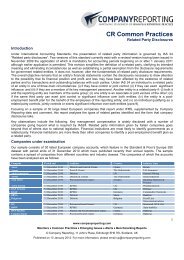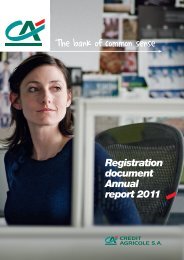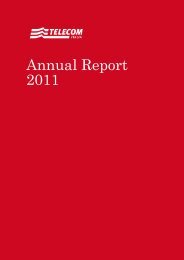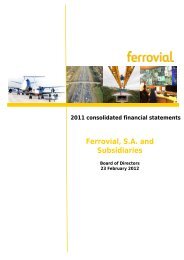BP Annual Report and Form 20-F 2011 - Company Reporting
BP Annual Report and Form 20-F 2011 - Company Reporting
BP Annual Report and Form 20-F 2011 - Company Reporting
- No tags were found...
You also want an ePaper? Increase the reach of your titles
YUMPU automatically turns print PDFs into web optimized ePapers that Google loves.
Corporate governancePrincipal accountants’ fees<strong>and</strong> servicesThe audit committee has established policies <strong>and</strong> procedures for theengagement of the independent registered public accounting firm, Ernst& Young LLP, to render audit <strong>and</strong> certain assurance <strong>and</strong> tax services. Thepolicies provide for pre-approval by the audit committee of specificallydefined audit, audit-related, tax <strong>and</strong> other services that are not prohibitedby regulatory or other professional requirements. Ernst & Young areengaged for these services when its expertise <strong>and</strong> experience of <strong>BP</strong> areimportant. Most of this work is of an audit nature. Tax services wereawarded either through a full competitive tender process or following anassessment of the expertise of Ernst & Young relative to that of otherpotential service providers. These services are for a fixed term.Under the policy, pre-approval is given for specific services withinthe following categories: advice on accounting, auditing <strong>and</strong> financialreporting matters; internal accounting <strong>and</strong> risk management controlreviews (excluding any services relating to information systems design<strong>and</strong> implementation); non-statutory audit; project assurance <strong>and</strong> advice onbusiness <strong>and</strong> accounting process improvement (excluding any servicesrelating to information systems design <strong>and</strong> implementation relating to <strong>BP</strong>’sfinancial statements or accounting records); due diligence in connectionwith acquisitions, disposals <strong>and</strong> joint ventures (excluding valuation orinvolvement in prospective financial information); income tax <strong>and</strong> indirecttax compliance <strong>and</strong> advisory services; employee tax services (excludingtax services that could impair independence); provision of, or accessto, Ernst & Young publications, workshops, seminars <strong>and</strong> other trainingmaterials; provision of reports from data gathered on non-financial policies<strong>and</strong> information; <strong>and</strong> assistance with underst<strong>and</strong>ing non-financial regulatoryrequirements. <strong>BP</strong> operates a two-tier system for audit <strong>and</strong> non-auditservices. For audit related services, the audit committee has a preapprovedaggregate level, within which specific work may be approved bymanagement. Non-audit services, including tax services, are pre-approvedfor management to authorize per individual engagement, but above adefined level must be approved by the chairman of the audit committeeor the full committee. The audit committee has delegated to the chairmanof the audit committee authority to approve permitted services providedthat the chairman reports any decisions to the committee at its nextscheduled meeting. Any proposed service not included in the approvedservice list must be approved in advance by the audit committee chairman<strong>and</strong> reported to the committee, or approved by the full audit committee inadvance of commencement of the engagement.The audit committee evaluates the performance of the auditorseach year. The audit fees payable to Ernst & Young are reviewed by thecommittee in the context of other global companies for cost effectiveness.The committee keeps under review the scope <strong>and</strong> results of audit work<strong>and</strong> the independence <strong>and</strong> objectivity of the auditors. External regulation<strong>and</strong> <strong>BP</strong> policy requires the auditors to rotate their lead audit partner everyfive years. (See Financial statements – Note 16 on page <strong>20</strong>9 <strong>and</strong> Auditcommittee report on page 127 for details of audit fees.)Memor<strong>and</strong>um <strong>and</strong> Articlesof AssociationThe following summarizes certain provisions of the company’sMemor<strong>and</strong>um <strong>and</strong> Articles of Association <strong>and</strong> applicable English law. Thissummary is qualified in its entirety by reference to the UK Companies Act<strong>20</strong>06 (Act) <strong>and</strong> the company’s Memor<strong>and</strong>um <strong>and</strong> Articles of Association.For information on where investors can obtain copies of the Memor<strong>and</strong>um<strong>and</strong> Articles of Association see Documents on display on page 170.At the AGM held on 17 April <strong>20</strong>08 shareholders voted to adopt newArticles of Association, largely to take account of changes in UK companylaw brought about by the Act. Further amendments to the Articles ofAssociation were approved by shareholders at the AGM held on 15 April<strong>20</strong>10. These amendments reflect the full implementation of the Act,among other matters.Objects <strong>and</strong> purposes<strong>BP</strong> is incorporated under the name <strong>BP</strong> p.l.c. <strong>and</strong> is registered in Engl<strong>and</strong><strong>and</strong> Wales with the registered number 102498. The provisions regulatingthe operations of the company, known as its ‘objects’, were historicallystated in a company’s memor<strong>and</strong>um. The Act abolished the need to haveobject provisions <strong>and</strong> so at the AGM held on 15 April <strong>20</strong>10 shareholdersapproved the removal of its objects clause together with all otherprovisions of its Memor<strong>and</strong>um that, by virtue of the Act, are treated asforming part of the company’s Articles of Association.DirectorsThe business <strong>and</strong> affairs of <strong>BP</strong> shall be managed by the directors. Thecompany’s Articles of Association provide that directors may be appointedby the existing directors or by the shareholders in a general meeting. Anyperson appointed by the directors will hold office only until the next generalmeeting <strong>and</strong> will then be eligible for re-election by the shareholders. Thereis no requirement for a director to retire on reaching any age.The Articles of Association place a general prohibition on a directorvoting in respect of any contract or arrangement in which the director hasa material interest other than by virtue of such director’s interest in sharesin the company. However, in the absence of some other material interestnot indicated below, a director is entitled to vote <strong>and</strong> to be counted in aquorum for the purpose of any vote relating to a resolution concerning thefollowing matters:• The giving of security or indemnity with respect to any money lent orobligation taken by the director at the request or benefit of the companyor any of its subsidiaries.• Any proposal in which the director is interested, concerning theunderwriting of company securities or debentures or the giving of anysecurity to a third party for a debt or obligation of the company or any ofits subsidiaries.• Any proposal concerning any other company in which the director isinterested, directly or indirectly (whether as an officer or shareholderor otherwise) provided that the director <strong>and</strong> persons connected withsuch director are not the holder or holders of 1% or more of the votinginterest in the shares of such company.• Any proposal concerning the purchase or maintenance of any insurancepolicy under which the director may benefit.136 <strong>BP</strong> <strong>Annual</strong> <strong>Report</strong> <strong>and</strong> <strong>Form</strong> <strong>20</strong>-F <strong>20</strong>11










